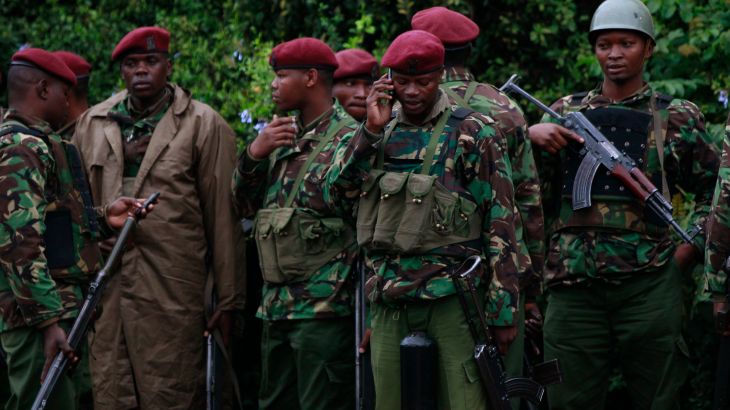
Al-Shabab: A war of vengeance?
As the Somali group claims responsibility for a brutal attack in Kenya, we examine the regional implications.
A gun battle inside a shopping centre in the Kenyan capital Nairobi has left at least 68 people dead and more than 150 wounded. Twenty-four hours later, an operation to secure the Westgate centre, one of the city’s most exclusive shopping malls, was ongoing. An unknown number of hostages are still being held.
The Somali group al-Shabab claimed responsibility for the attack, demanding that Kenya pull troops back from its neighbouring country, where al-Shabab is fighting against the government.
I would suggest that more than a thousand attacks that have taken place inside Kenya in the last two years have probably been carried out by al-Shabab whether they acknowledge complicity or not. The evidence would suggest that. So this is not, in my view, the first attack by al-Shabab inside Kenya, it's simply by far the biggest one.
Its full name is Harakat al-Shabab al-Mujahideen – or the Movement of Jihadi Youth. It was formed in 2006 as an off-shoot of the Islamic Courts Union, a religious alliance which controlled large parts of Somalia, before being driven out.
With as many as 9,000 fighters, al-Shabab has since fought a succession of foreign forces in Somalia from Ethiopia, Kenya and Uganda.
The attack in Nairobi is one of the biggest al-Shabab has carried out outside Somalia. It could not have come at a more improbable time as the territory al-Shabab controls in Somalia is shrinking.
The group has also just emerged from a leadership struggle. Al-Shabab’s shadowy leader Ahmed Abdi Godane managed to re-align the group’s leadership and consolidate his power by killing some of his main opponents.
Kenyan President Uhuru Kenyatta said that the country had “overcome terrorist attacks before” and vowed to “hunt down the perpetrators wherever they run to”.
“In fact, we have fought courageously and defeated them within and outside our borders – we will defeat them again,” he added.
So-called militant groups have been expanding their reach across the Sahel and the Sahara over the last decade.
Most of them operate under the umbrella of al-Qaeda in the Maghreb (AQIM) which has its reach in Mali, Algeria, Libya and Tunisia. Another organisation gaining traction is Boko Haram. Based mainly in northern Nigeria they are determined to bring Islamic law to the region. And there is al-Shabab who wants the removal of all foreign forces from Somalia.
So how will the Kenyan government respond to the latest al-Shabab attack? Will it mean more involvement in Somalia? And what are the regional implications?
Inside Story, with presenter Jane Dutton, discusses with guests: Hamza Mohamed, a British-Somali journalist; Ambassador David Shinn, a former US ambassador to Ethiopia and former state department coordinator for the intervention in Somalia in the 1990s; and Miguna Miguna, a Kenyan barrister and former adviser to Kenyan Prime Minister Raila Odinga.
|
“We need to go back before Kenyan troops went into Somalia …. Al-Shabab commanders were really angry at what they see as a broken … relation between them and the Kenyan government. Before 2011, before the Kenyan forces went into Somalia, al-Shabab controlled almost all the towns bordering Kenya and Somalia, and at that time that region of Kenya was very peaceful … what al-Shabab commanders says [is that] Kenya was at the same time planning to attack them … [and] at the same time telling them that everything was ok. As long as you don’t interfere or do anything in Kenya borders we would not attack, so al-Shabab see this as a reaction to what they see as a Kenyan action, Kenyan forces invading Somalia.” Hamza Mohamed, a British-Somali journalist |